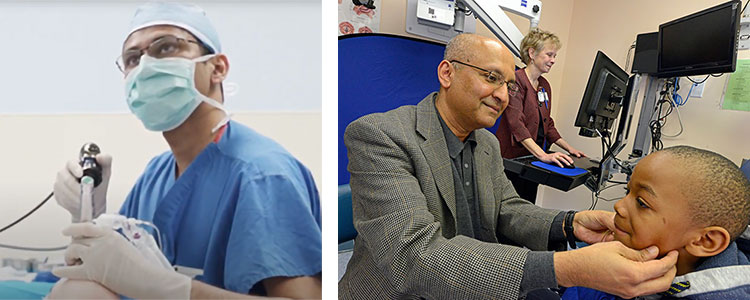Checking out the Field of Otolaryngology: What to Anticipate When You Seek Advice From an ENT
Otolaryngology, typically referred to as ENT, includes the medical diagnosis and treatment of throat, ear, and nose problems. Hearing. For those experiencing relevant problems, consulting an ENT specialist can supply quality and relief. Understanding what to anticipate during such consultations is essential for efficient communication and care. This overview will certainly describe vital aspects of the ENT experience, including typical factors for sees and the processes included in diagnosis and therapy
Comprehending Otolaryngology: An Overview
Otolaryngology, typically referred to as ENT (Throat, ear, and nose) medicine, is a specific branch of medicine that focuses on the diagnosis and treatment of problems affecting these crucial areas of the body. This field incorporates a large range of conditions, consisting of those related to hearing, balance, respiratory function, and speech. Otolaryngologists are trained to handle both medical and clinical treatments, utilizing innovative strategies and innovations. Their proficiency extends beyond typical disorders, dealing with problems such as allergies, sinus infections, and hearing loss. In addition, they play a crucial duty in the monitoring of head and neck cancers, offering complete treatment customized to private client requirements. In general, otolaryngology stays important for preserving health and wellness and quality of life in damaged people.
Common Factors to See an ENT Professional
Many people look for the experience of an ENT professional for a variety of reasons, mirroring the varied nature of conditions that affect the ear, throat, and nose. Typical concerns include chronic sinusitis, which usually brings about persistent nasal blockage and facial discomfort. Allergic reactions and their connected signs, such as itching and sneezing, additionally motivate brows through to these experts. Hearing loss, whether progressive or unexpected, is one more significant reason for assessment. On top of that, individuals may seek examination for throat disorders, consisting of persistent hoarseness or ingesting troubles. Sleep apnea, characterized by disrupted breathing during rest, is often attended to by ENT experts. Each of these conditions highlights the relevance of specialized treatment in taking care of complicated ENT-related health concerns.
Preparing for Your ENT Appointment
When preparing for an ENT visit, it is important to gather appropriate information and take into consideration any type of certain concerns. Individuals need to put together a thorough clinical history, consisting of previous ear, nose, or throat problems, surgical treatments, and current drugs. Recording signs-- such as severity, regularity, and duration-- can give beneficial insights for the ENT professional. Additionally, individuals need to prepare a list of inquiries they want to ask, making sure that all problems are resolved throughout the visit. Bringing along any type of relevant clinical records or test outcomes can better assist the ENT in comprehending the individual's problem. Finally, people must confirm their appointment details, consisting of day, area, and time, to reduce any last-minute complication. Proper preparation can improve the effectiveness of the assessment and bring about much better outcomes.

What to Expect Throughout the Assessment
As the appointment starts, the patient can anticipate to take part in a comprehensive conversation with the ENT specialist regarding their signs and medical background. The specialist will certainly ask about the duration, frequency, and extent of signs such as hearing loss, nasal blockage, or sore throat. Furthermore, the individual's previous medical conditions, drugs, and any relevant household background will certainly be reviewed, assisting the specialist in developing a complete understanding of the person's health and wellness. The ENT may also inquire about lifestyle factors, such as direct exposure to irritants or toxic irritants. This open discussion develops a structure for the examination, making sure that the individual's issues are resolved and setting the stage for any kind of required evaluations or recommendations for treatment.
Diagnostic Tests and Treatments in Otolaryngology
A series of analysis examinations and procedures are vital in otolaryngology to properly evaluate and detect conditions affecting the ear, throat, and nose. Typical examinations include audiometry, which measures hearing feature, and tympanometry, analyzing center ear pressure. Nasal endoscopy allows visualization of the nasal passages and sinuses, while laryngoscopy checks out the throat and singing cables. Imaging strategies, such as CT scans and MRIs, supply in-depth sights of head and neck structures. Allergy testing may also be conducted to determine triggers for sinus or respiratory system problems. These analysis devices make it possible for ENT experts to create a detailed understanding of clients' conditions, making certain customized and effective management strategies. Proper diagnosis is necessary for successful treatment end results in otolaryngology.
Treatment Alternatives Used by ENT Specialists
ENT professionals supply a selection of treatment choices tailored to deal with details conditions impacting the nose, ear, and throat. These therapies range from conservative techniques, such as medication and way of life alterations, to even more intrusive treatments. Allergies might be handled with antihistamines or immunotherapy, while persistent sinus problems might need nasal corticosteroids or sinus surgery. For hearing loss, ENT professionals frequently advise listening device or surgical treatments like cochlear implants. In situations of throat conditions, choices can consist of speech treatment or surgeries to get rid of obstructions. Additionally, they may provide support for taking care of rest apnea, including the usage of CPAP tools or medical treatments. On the whole, the goal is to improve individuals' lifestyle through personalized care and efficient therapy techniques.
When to Look For Follow-Up Treatment With an ENT
When to look for follow-up treatment with an ENT specialist is important for managing continuous signs or complications related to nose, throat, and ear problems, acknowledging. Clients must consider arranging a follow-up visit if signs and symptoms linger in spite of initial treatment, such as persistent ear pain, nasal blockage, or throat pain. Changes in hearing, balance issues, or unusual nasal discharge may likewise require more assessment. Furthermore, if a person experiences side impacts from prescribed drugs or has actually undergone a surgical procedure, follow-up treatment is essential to check recuperation and deal with any worries. Timely assessments can guarantee efficient monitoring of conditions, avoid potential complications, and provide comfort relating to one's health and wellness. Seeking follow-up care promotes proactive health and wellness administration in otolaryngology
Often Asked Questions
What Qualifications Should I Search for in an ENT Professional?
When seeking an ENT professional, one should try to find board qualification, pertinent experience, and solid individual evaluations. Additionally, effective communication abilities and a thoughtful technique can substantially enhance the overall treatment experience.
Exactly how Do I Choose the Right ENT for My Requirements?
Picking the best ENT specialist entails examining their certifications, experience, and individual testimonials. It is important to ponder their interaction design and approach to therapy, ensuring they straighten with the individual's particular wellness needs and choices.
Are There Any Type Of Dangers Associated With ENT Procedures?
The threats related to ENT procedures might include infection, blood loss, anesthesia issues, and possible damages to bordering structures. People need to discuss these threats with their doctor to comprehend private problems and warranty notified choices.
How Can I Handle Anxiety Before My ENT Visit?
To handle anxiousness prior to a consultation, people can practice deep breathing workouts, picture favorable outcomes, prepare inquiries in breakthrough, and look for support from buddies or family, promoting a sense of peace of mind and calmness.

What Should I Do if I Experience Adverse Effects From Therapy?
If side impacts from therapy occur, the individual needs to quickly report them to their doctor. Otolaryngologist. Adjustments to treatment or additional interventions may be essential to assure safety and effectiveness in managing their condition. As the appointment begins, the patient can expect to engage in a complete discussion with the ENT expert about their signs and symptoms and clinical history. These analysis tools enable ENT experts to develop a thorough understanding of patients' conditions, ensuring tailored and effective management plans. ENT professionals provide a selection of treatment alternatives customized to attend to particular problems influencing the ear, throat, and nose. When seeking an ENT expert, one ought to look for board accreditation, pertinent experience, and strong patient reviews. Choosing the right Sinus ENT professional involves examining their certifications, experience, and patient reviews